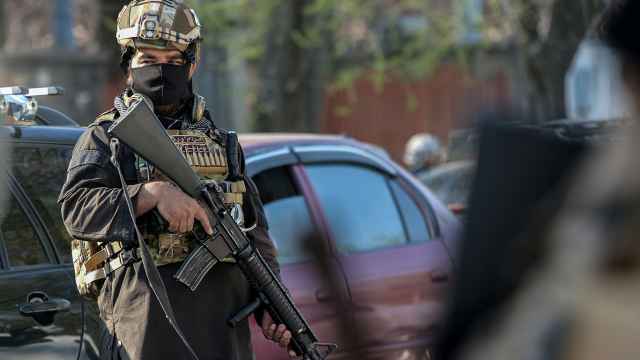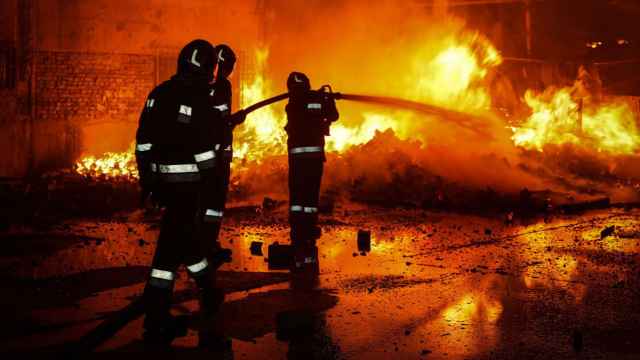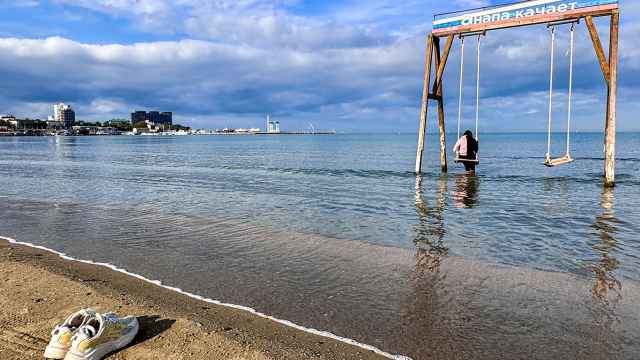Tens of thousands of people marched along Moscow's Boulevard Ring on Saturday to protest Russia's action in Crimea and the crackdown on independent media they say has accompanied it.
The rally, which some opposition activists said was the largest in a year, was initially expected to be aimed against a potential war with Ukraine.
But the appointment of a pro-Kremlin editor at the Lenta.ru news site late last week and the blocking of several opposition sites, as well as prominent opposition leader Alexei Navalny's blog, were added to the event's agenda at the last minute.
The organizers estimated the number of participants at 70,000, while AFP said 50,000 attended the march, and police counted 3,000 protesters.
The rally featured an unprecedented number of Russian flags, as well as Ukrainian ones. While previously the main symbol of Russia's opposition movement had been a white ribbon, national symbols have been used more often in recent months — an apparent nod to protesters from the recent Ukrainian uprising.
Some of the more prominent slogans at Saturday's march also came from the recent protests in Kiev. These included "Long live Ukraine — long live the heroes! and "Long live the Heavenly Hundred!" — a reference to the at least 109 protesters who were killed during the revolution. Some participants of the protest adapted the Ukrainian slogans, chanting "Long live Russia — long live the heroes!"
The theme of peace with Ukraine, a country with close cultural and linguistic links to Russia that is often called "brotherly," dominated at the rally.
One protester alluded to the biblical story about Cain killing Abel, carrying a poster that read "Russia, where is Abel, thy brother?"
"Ukraine is a brotherly country, and we will not allow [the Kremlin] to drag us into a fratricidal war," Ilya Yashin, a leader of the RPR-Parnas party, said at the protest.
Yashin said the national interests of Russia depended on being a peaceful country and respecting the sovereignty of other countries, calling President Vladimir Putin "an enemy of Russia."
"We are told that Putin is creating a great, strong Russia," he said. "But what is strength? An aggressive, unpredictable, unreliable country that claims territory belonging to a neighboring state — is that the image of a strong Russia?"
A group of demonstrators held Japanese characters meaning "peace," and the rally also featured pictures of atrocities caused by military conflicts.
Two protesters carried a poster reading "Make salo, not war" — a reference to a traditional Ukrainian pork dish — and had slices of salo laid out before them. They also held signs reading "1914-2014," comparing the Crimean crisis to World War I, and "Sarajevo=Kiev," a reference to the Bosnian War.
Several participants also referred to the fact that the Russian state had its roots in Kievan Rus.
"Kiev is the mother of Russian cities," said Roman Dobrokhotov, an activist of the Solidarity movement. "Kiev is where Russia comes from and where it will get a new lease on life."
Another protester ridiculed Putin's recent statement that Ukraine's secession from the Soviet Union was not completely legal, holding a placard saying "Russian principalities' secession from Kievan Rus was not quite legal."
Putin's decision to intervene in Crimea was seen by some protesters as a sign of madness and by others as a step toward an outright dictatorship.
Two demonstrators in white coats held a picture of Putin in a straitjacket, while another one carried a placard reading "Putin, your friends Nicolae Ceaucescu, Muamar Gaddafi and Saddam Hussein are waiting for you."
Apart from the Crimean crisis, the rally was also devoted to what protesters saw as the Kremlin's attempts to stifle independent media and introduce a more authoritarian regime, with some posters saying "I do not want to live in North Korea" and "Down with a throwback to the Soviet Union!"
Anton Mazurov, a 45-year-old film critic who attended the protest, said that the apparent crackdown on independent media was a reaction to the Ukrainian revolution.
"This is a hysterical reaction. These media posed no threat to the Kremlin," he said, adding that he had come to the rally because of "the absurdity of what is happening."
Contact the author at o.sukhov@imedia.ru
A Message from The Moscow Times:
Dear readers,
We are facing unprecedented challenges. Russia's Prosecutor General's Office has designated The Moscow Times as an "undesirable" organization, criminalizing our work and putting our staff at risk of prosecution. This follows our earlier unjust labeling as a "foreign agent."
These actions are direct attempts to silence independent journalism in Russia. The authorities claim our work "discredits the decisions of the Russian leadership." We see things differently: we strive to provide accurate, unbiased reporting on Russia.
We, the journalists of The Moscow Times, refuse to be silenced. But to continue our work, we need your help.
Your support, no matter how small, makes a world of difference. If you can, please support us monthly starting from just $2. It's quick to set up, and every contribution makes a significant impact.
By supporting The Moscow Times, you're defending open, independent journalism in the face of repression. Thank you for standing with us.
Remind me later.





